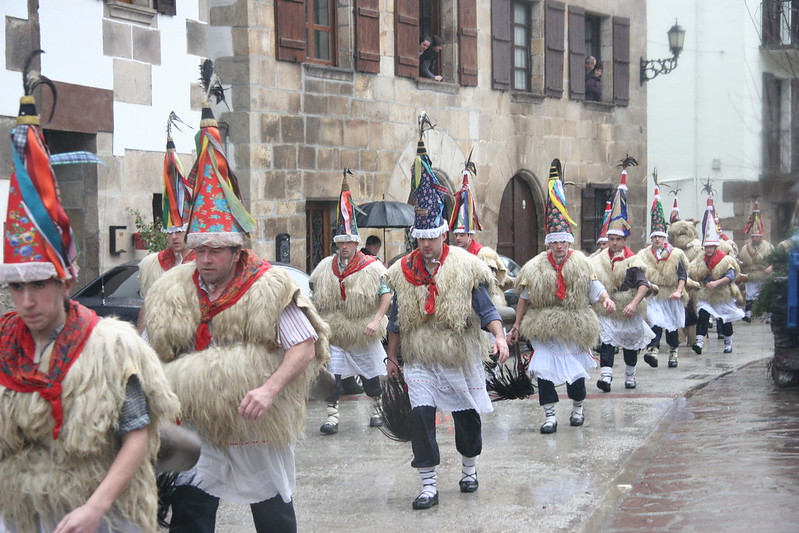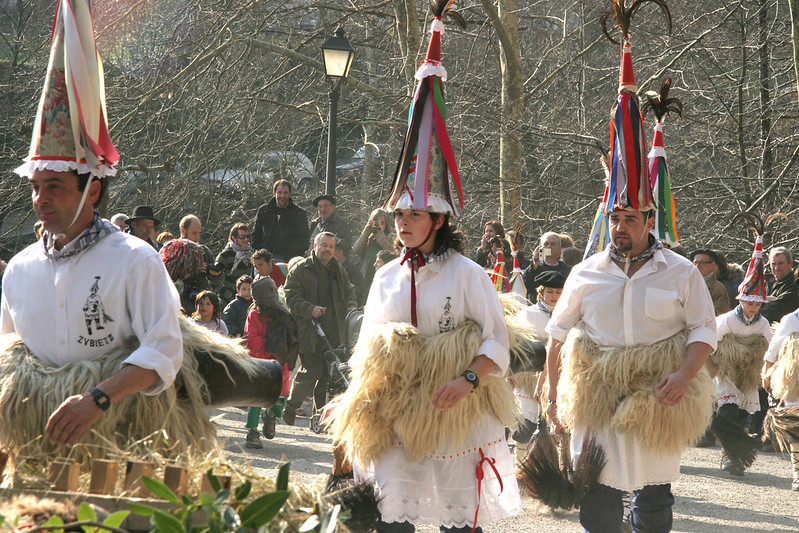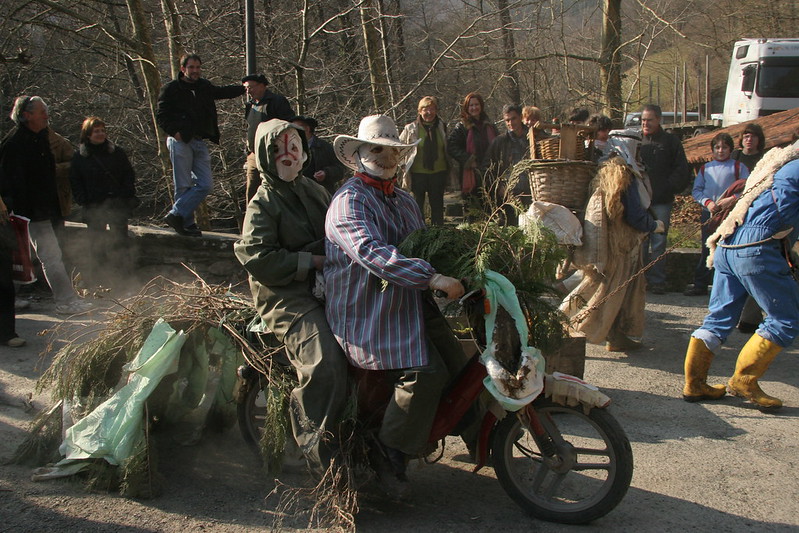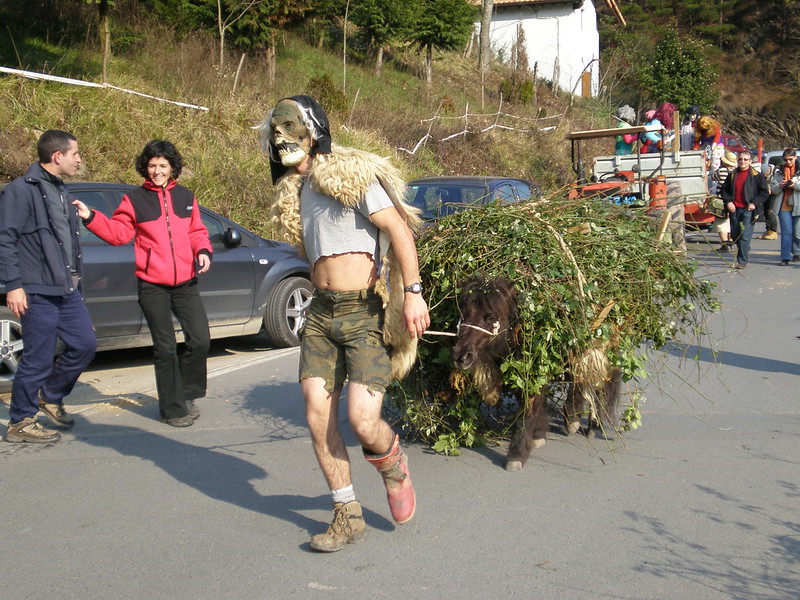Carnavales de Ituren y Zubieta
Ancient Echoes and the Festival that Awakens Spring in the Basque Mountains
2026/01/25 - 2026/01/26
Every January, in the mountain villages of Ituren and Zubieta in northern Spain’s Basque Country, a carnival unfolds that seems to have stepped straight out of ancient myth. The Carnival of Ituren & Zubieta is a raw, earthy celebration, distinct from modern carnivals. The thunder of cowbells and the scent of bonfires fill the crisp winter air, inviting both locals and travelers into a “living legend” where earth, nature, and community pulse together in rhythm.
Held every year on the last Monday and Tuesday of January, this is a must for anyone seeking tradition, folklore, and a deep sense of connection with nature. Anyone can join, but it’s especially recommended for lovers of folk culture, photographers, and those who want to truly feel the spirit of the Basque winter.
Main Attractions
Zanpantzar Procession
The heart of the festival is the “Zanpantzar” procession. Men known as Joaldunak (“bell bearers”) don sheepskin vests, conical hats with ribbons, and heavy cowbells strapped to their waists, marching from village to village. Dozens of Joaldunak walk in perfect step, their bells echoing through the mountains, believed to drive away evil spirits and awaken the earth. The sight is mystical and powerful—a true glimpse into an ancient ritual.
Key Events
On Monday, the Joaldunak from Zubieta march to Ituren, welcomed by villagers with music, dance, and local wine. On Tuesday, Ituren’s Joaldunak march to Zubieta. Along the way, mischievous characters in ragged clothes or wild costumes throw flour and chase spectators, adding humor and chaos to the solemn procession. At night, villagers and visitors gather around bonfires for Basque music, singing, and traditional food.
Costumes and Decorations
Joaldunak wear sheepskin vests, white shirts, blue scarves, and conical hats with colorful ribbons. They strap up to 12 kg of cowbells to their waists, producing a deep, resonant sound with every step. Other participants wear eerie masks, patchwork costumes, and carry sticks or brooms, embodying spirits of chaos or fertility. The villages are decorated with pine branches, rustic banners, and bonfires, creating a mysterious and nostalgic atmosphere.
Traditional Food & Drink
After the processions, everyone gathers in local taverns or communal halls to enjoy hearty Basque fare: country bread, chorizo, sheep’s cheese, and bean stew, with local cider and red wine flowing freely. The aroma of bonfires, grilled meat, corn flatbread (“talo”), and walnut dessert (“intxaursaltsa”) fills the air—flavors unique to winter in the Basque mountains.
Cultural and Historical Background
The origins of the Ituren & Zubieta Carnival are unclear, but it’s believed to predate Christianity, rooted in ancient Basque and Pyrenean fertility rituals. The Joaldunak’s bell-ringing is an old rite to awaken the earth, drive away evil, and pray for a good harvest. For centuries, the festival has symbolized village identity and the bonds of community.
For locals, this carnival is not just a spectacle, but a sacred and joyful reunion that reaffirms connections to the land and to each other across generations. It’s a living testament to Basque respect for nature, ancestors, and the cycles of life.
Participant Voices
I came after seeing photos from Barcelona, but the power of the bells was beyond imagination. The thunder resonated in my chest, and the Joaldunak looked like something out of a myth. My kids loved the masked characters throwing flour—everyone ended up covered and laughing. The food was amazing, especially the cheese and cider. It truly felt like stepping into another world.
Fun Facts
- Each Joaldun marches with up to 12 kg (about 26 lbs) of cowbells strapped to their waist.
- This is considered one of the oldest carnivals in Europe, retaining a strong sense of simplicity and mystery.
- Ituren and Zubieta are only 3 km apart, and the Joaldunak walk the route between the villages over two days.
- “Joaldun” comes from the Basque verb “jo,” meaning “to ring.”
- Spectators should wear clothes that can get dirty—flour is everywhere!
Festival Dates
The Carnival of Ituren & Zubieta takes place every year on the Monday and Tuesday following the last Sunday in January.
The event schedule is subject to change. Please check the official website for the most up-to-date information.
Information
| Name | Carnavales de Ituren y Zubieta |
| Country | Spain |
| Area | Navarre, Ituren/Zubieta |
| Date | 2026/01/25 - 2026/01/26 |
| Link |
Upcoming Festivals
Kukeri(Surva) Bulgaria
Bulgaria’s Festival of Spirits, Fire, and Bells That Drives Away Winter
2026/01/22Dinagyang Philippines
Iloilo’s Thunderous Festival of Faith, Tradition, and Dance
2026/01/22The Northern Lights Festival (Nordlysfestivalen) Norway
A Tromsø Miracle: Music and Aurora Dancing in the Arctic Night
2026/01/25Carnavales de Ituren y Zubieta Spain
Ancient Echoes and the Festival that Awakens Spring in the Basque Mountains
2026/01/26Up Helly Aa United Kingdom
A Night When Fire and Viking Pride Blaze in Shetland
2026/01/29Winterlude Canada
A Wonderland of Ice, Light, and Smiles in Canada’s Capital Region
2026/01/30Carnival of Viareggio (Carnevale de Viareggio) Italy
A Spectacular Parade of Giant Papier-Mâché Masterpieces
2026/01/30Fiesta de la Candelaria(Virgin of Candelaria) Peru
A Grand Dance Festival of Faith and Folklore Echoing on the Shores of Lake Titicaca
2026/01/31Thaipusam Malaysia
A Pilgrimage of Prayer and Penance Illuminates Batu Caves
2026/01/31Jaisalmer Desert Festival India
When Rajasthan’s Golden Dunes Dazzle with Color and Culture



